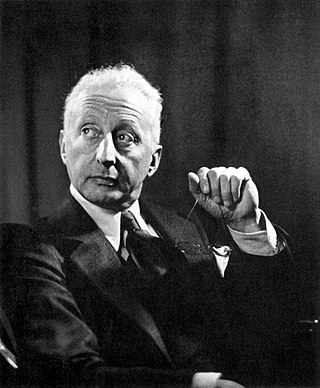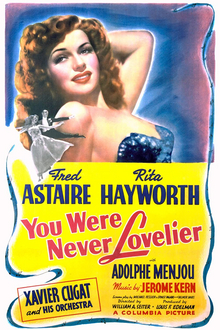Related Research Articles

Jerome David Kern was an American composer of musical theatre and popular music. One of the most important American theatre composers of the early 20th century, he wrote more than 700 songs, used in over 100 stage works, including such classics as "Ol' Man River", "Can't Help Lovin' Dat Man", "A Fine Romance", "Smoke Gets in Your Eyes", "The Song Is You", "All the Things You Are", "The Way You Look Tonight" and "Long Ago ". He collaborated with many of the leading librettists and lyricists of his era, including George Grossmith Jr., Guy Bolton, P. G. Wodehouse, Otto Harbach, Oscar Hammerstein II, Dorothy Fields, Johnny Mercer, Ira Gershwin and Yip Harburg.

Fred Astaire was an American dancer, actor, singer, musician, choreographer, and presenter, whose career in stage, film, and television spanned 76 years. He is widely regarded as the "greatest popular-music dancer of all time" He received an Honorary Academy Award, a BAFTA Award, three Emmy Awards, two Golden Globe Awards, and a Grammy Award.
This is a list of notable events in music that took place in the year 1936.

Swing Time is a 1936 American musical comedy film, the sixth of ten starring Fred Astaire and Ginger Rogers. Directed by George Stevens for RKO, it features Helen Broderick, Victor Moore, Betty Furness, Eric Blore and Georges Metaxa, with music by Jerome Kern and lyrics by Dorothy Fields. Set mainly in New York City, the film follows a gambler and dancer, "Lucky" (Astaire), who is trying to raise money to secure his marriage when he meets a dance instructor, Penny (Rogers), and begins dancing with her; the two soon fall in love and are forced to reconcile their feelings.

"Night and Day" is a popular song by Cole Porter that was written for the 1932 musical Gay Divorce. It is perhaps Porter's most popular contribution to the Great American Songbook and has been recorded by dozens of musicians. NPR says "within three months of the show's opening, more than 30 artists had recorded the song."

You Were Never Lovelier is a 1942 American musical romantic comedy film directed by William A. Seiter and starring Fred Astaire and Rita Hayworth. The supporting cast also features Adolphe Menjou, Xavier Cugat and Adele Mara. The music was composed by Jerome Kern and the lyrics by Johnny Mercer. The picture was released by Columbia Pictures and includes the elaborate "Shorty George" and romantic "I'm Old Fashioned" song and dance sequences.

"The Way You Look To-night" is a song from the film Swing Time that was performed by Fred Astaire and composed by Jerome Kern with lyrics written by Dorothy Fields. It won the Academy Award for Best Original Song in 1936. Fields remarked, "The first time Jerry played that melody for me I went out and started to cry. The release absolutely killed me. I couldn't stop, it was so beautiful."

"A Fine Romance" is a popular song composed by Jerome Kern with lyrics by Dorothy Fields, published in 1936.
"Dancing in the Dark" is a popular American song, with music by Arthur Schwartz and lyrics by Howard Dietz, that was introduced by John Barker with Tilly Losch dancing in the 1931 revue The Band Wagon. The song was first recorded by Bing Crosby on August 19, 1931 with Studio Orchestra directed by Victor Young, staying on the pop charts for six weeks, peaking at #3, and helping to make it a lasting standard.
"Nice Work If You Can Get It" is a popular song and jazz standard composed by George Gershwin with lyrics by Ira Gershwin.
"It's Easy to Remember " is a popular song written by Richard Rodgers with lyrics by Lorenz Hart.

Never Gonna Dance is a Broadway musical featuring the music of Jerome Kern. The musical was based on the 1936 Fred Astaire/Ginger Rogers film Swing Time. Lyricists include Oscar Hammerstein, Ira Gershwin, P. G. Wodehouse, Bernard Dougall, Johnny Mercer, Jimmy McHugh, Otto Harbach, and Dorothy Fields.
"I Won't Dance" is a song with music by Jerome Kern that has become a jazz standard. The song has two different sets of lyrics: the first written by Oscar Hammerstein II and Otto Harbach in 1934, and second written by Dorothy Fields in 1935.
"Isn't This a Lovely Day?" is a popular song written by Irving Berlin for the 1935 film Top Hat, where it was introduced by Fred Astaire in the scene where his and Ginger Rogers' characters are caught in a gazebo during a rainstorm. The lyric is an example of a song which turns a bad situation into a love song, a common style for Irving Berlin, as in "I've Got My Love to Keep Me Warm" and "Let's Have Another Cup of Coffee".

"Why Was I Born?" is a 1929 song composed by Jerome Kern, with lyrics written by Oscar Hammerstein II.
"You Couldn't Be Cuter" is a 1938 song composed by Jerome Kern, with lyrics written by Dorothy Fields.
"She Didn't Say Yes" is a 1931 song composed by Jerome Kern, with lyrics by Otto Harbach.
"Pick Yourself Up" is a popular song composed in 1936 by Jerome Kern, with lyrics by Dorothy Fields. It has a verse and chorus, as well as a third section, though the third section is often omitted in recordings. Like most popular songs of the era it features a 32 bar chorus, though with an extended coda.

Roberta is a 1935 American musical film released by RKO Radio Pictures and directed by William A. Seiter. It stars Irene Dunne, Fred Astaire, Ginger Rogers, and features Randolph Scott, Helen Westley, Victor Varconi and Claire Dodd. The film was an adaptation of the 1933 Broadway musical Roberta, which in turn was based on the novel Gowns by Roberta by Alice Duer Miller. It was a solid hit, showing a net profit of more than three-quarters of a million dollars.

Fred Astaire and Ginger Rogers were dance partners in a total of 10 films, 9 being released by RKO Pictures from 1933 to 1939, and 1, The Barkleys of Broadway, by Metro-Goldwyn-Mayer in 1949, their only Technicolor film.
References
- ↑ "Original versions of Never Gonna Dance written by Jerome Kern, Dorothy Fields | SecondHandSongs". secondhandsongs.com. Retrieved 2021-08-04.
- ↑ Whitburn, Joel (1986). Joel Whitburn's Pop Memories 1890-1954 . Menomonee Falls, Wisconsin: Record Research Inc. p. 37. ISBN 0-89820-083-0.
- ↑ "45worlds.com". 45worlds.com. Retrieved April 29, 2019.
- ↑ "honkingduck.com". honkingduck.com. Retrieved April 29, 2019.
- ↑ "honkingduck.com". honkingduck.com. Retrieved April 29, 2019.